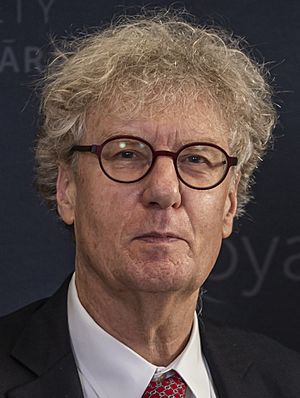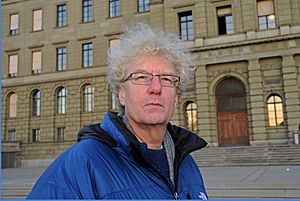Jack Copeland facts for kids
Quick facts for kids
Jack Copeland
|
|
|---|---|
 |
|
| Born |
Brian Jack Copeland
1950 (age 75–76) |
| Nationality | British |
| Alma mater | University of Oxford (BPhil, DPhil) |
| Scientific career | |
| Fields | Philosophy Logic Alan Turing |
| Institutions | University of Plymouth University of Canterbury |
| Thesis | Entailment : the formalisation of inference (1978) |
| Doctoral advisor | Dana Scott |
Brian Jack Copeland (born in 1950) is a Professor of Philosophy at the University of Canterbury in Christchurch, New Zealand. He is well-known for writing many books about the famous computer pioneer, Alan Turing.
Contents
Learning and Early Career
Jack Copeland studied at the University of Oxford in the United Kingdom. He earned two important degrees there, including a Doctor of Philosophy degree in 1978. During his studies, he focused on advanced types of logic, which is a way of thinking about how ideas connect. His teacher was a famous logician named Dana Scott.
Work and Discoveries
Jack Copeland is the leader of the Turing Archive for the History of Computing. This is a huge online collection of information about Alan Turing, who was a very important person in the early days of computers. Copeland has also written and edited several books about Turing's life and work.
He helped identify the idea of hypercomputation. This is about imagining computers that could be even more powerful than the ones we have today. With a colleague named Jason Long, he also helped bring back some of the very first computer music ever recorded. This music was made on an old computer called the Ferranti Mark I.
Visiting Professor Roles
Professor Copeland has taught at many universities around the world. He was a visiting professor in Australia, Denmark, and the United Kingdom. In 2000, he was a Senior Fellow at a special institute in the United States that studies the history of science and technology.
Other Important Roles
Copeland is also the President of a group called the US Society for Machines and Mentality. He is also part of an advisory group for the Bletchley Park Trust in the UK. Bletchley Park was a secret place where codebreakers worked during World War II. He also started an online journal called The Rutherford Journal in 2005.
In 2012, Jack Copeland and Diane Proudfoot suggested creating a "Turing Center" in Zurich, Switzerland. This idea became real, and the Turing Center Zurich opened in 2015. It holds regular meetings and discussions about computers, artificial intelligence, and other related topics.
The Rutherford Journal
|
Abbreviated title (ISO 4)
|
Rutherford J. |
|---|---|
| Discipline | History and philosophy of science |
| Language | English |
| Edited by | Jack Copeland |
| Publication details | |
| Publisher |
University of Canterbury (New Zealand)
|
|
Publication history
|
2005 onwards |
| Indexing | |
| ISSN | 1177-1380 |
| OCLC no. | 145735058 |
| Links | |
|
|
Copeland is the main editor of The Rutherford Journal. This is an online academic journal from New Zealand. It shares articles about the history and philosophy of science and technology. The journal is open-access, which means anyone can read the articles for free online.
The journal started in December 2005. It is named after Ernest Rutherford, a famous New Zealand physicist. He studied at the University of Canterbury, where the journal is published. The journal covers many different technologies, from old calculating machines to early computers like the CSIRAC.
Books by Jack Copeland
Jack Copeland has written or helped write many books. Most of them are about Alan Turing and the history of computing. Here are some of his well-known books:
- Artificial Intelligence: A Philosophical Introduction (1993)
- Logic and Reality Essays on the Legacy of Arthur Prior (1996)
- The Essential Turing (2004)
- Alan Turing’s Automatic Computing Engine: The Master Codebreaker's Struggle to Build the Modern Computer (2005)
- Colossus: The Secrets of Bletchley Park's Codebreaking Computers (2006)
- Alan Turing’s Electronic Brain: The Struggle to Build the ACE, the World’s Fastest Computer (2012)
- Computability: Turing, Gödel, Church, and Beyond (2013) (with others)
- Turing: Pioneer of the Information Age (2014)
- The Turing Guide (2017) (with others)
Awards
In 2010, the students at the University of Canterbury chose Jack Copeland as their "Lecturer of the Year." This award shows how much students enjoyed his teaching.
See also
 In Spanish: Jack Copeland para niños
In Spanish: Jack Copeland para niños
 | Frances Mary Albrier |
 | Whitney Young |
 | Muhammad Ali |


